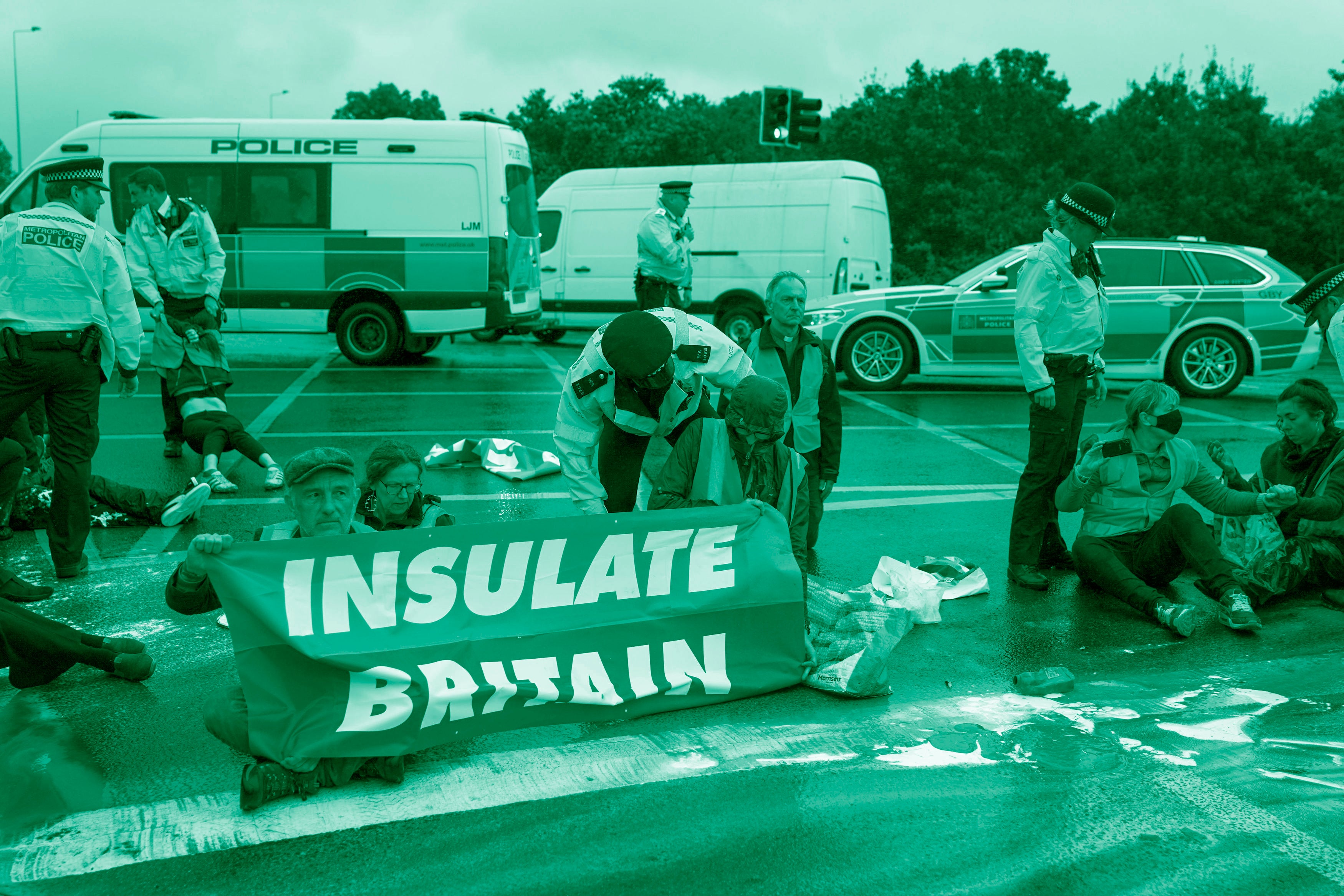Insulate Britain: Who are the roadblock protesters and what do they want?

Around 50 Insulate Britain activists glued their hands and feet to the road outside the Houses of Parliament in Westminster on Thursday 4 November, their latest stunt to draw attention to the climate emergency following road occupations in Manchester and Birmingham and a thwarted attempted to block the M25 in the same week.
The environmental group has become increasingly active since summer 2021, particularly in late October in the run-up to the crucial Cop26 summit in Glasgow, Scotland.
Previously, 14 protesters in orange high-visibility vests had sat on the same stretch of motorway holding banners to stop cars, buses and lorries getting by to demand action from the government to improve home insulation and cut domestic energy waste, a key contributor to the climate crisis.
That demonstration was the collective’s third of the working week after its members prevented traffic passing along the A40 into London and occupied three locations across the City of London, when Liverpool Street, Upper Thames Street and Limehouse Causeway were all targeted.
What are their goals?
Insulate Britain has two stated “demands” listed on its website.
The first insists the UK government “immediately promises to fully fund and take responsibility for the insulation of all social housing in Britain by 2025”.
The second calls on the British state “to produce within four months a legally binding national plan to fully fund and take responsibility for the full low-energy and low-carbon whole-house retrofit, with no externalised costs, of all homes in Britain by 2030 as part of a just transition to full decarbonisation of all parts of society and the economy”.
What activities have they been engaged in?
Insulate Britain’s “campaign of civil resistance” has seen its members blockade busy roads in and around the capital, from the M25 to Old Street roundabout, the Blackwall Tunnel and Wandsworth Bridge, in order to draw attention to perceived inaction and insincerity on green issues from Boris Johnson’s Cabinet.
Its demonstrators have risked arrest as well as their own safety to make their point and have been hailed with abuse by irate drivers.
They have also been physically dragged from roads to clear a path and even had black ink thrown in their faces, with some opponents complaining of missed appointments and other inconveniences they claim to have suffered as a consequence of the campaigners’ blockades.
What criticism have they attracted?
The prime minister had previously dismissed Insulate Britain activists as “irresponsible crusties” during an interview with LBC.
“There are some people who call those individuals legitimate protesters,” he told the radio station. “They are not. I think they are irresponsible crusties who are basically trying to stop people going about their day’s work and doing considerable damage to the economy.”
Insulate Britain has been called worse.
ITV’s Good Morning Britain anchor Richard Madeley got into a heated debate on air with Insulate Britain’s Liam Norton on 14 September and accused him of “blocking out reality” and “ignoring the reality of the individual”, telling him the group’s tactics amounted to “fascism”.
“I think you’re confused, Richard, about what that word means,” Mr Norton responded.
That would not even prove to be their most hostile interview, the Madeley grilling surpassed by an argument erupting on Talk Radio on 26 October when activist Cameron Ford was questioned on Zoom by a disgruntled Mike Graham, who attempted to take Mr Ford, a carpenter by trade, to task for hypocrisy on the basis that he relies on timber, which can be a product of deforestation, to do his job.
The eco-spokesman dismissed this snide attack on the grounds that wood was a regenerative material and therefore sustainable before the host blusteringly retorted that “you can grow lots of things” and cited concrete as his example.
The exchange was swiftly terminated amid a crackle of awkward silence and baffled exasperation and, unsurprisingly, immediately went viral.
New Green Party co-leader Carla Denyer has also said that while there is a place for direct action, Insulate Britain is “not necessarily always doing it in the most constructive way”.
Transport for London was meanwhile granted a High Court injunction to stop the environmentalists from obstructing traffic on 8 October, with a spokesman saying: “This will help to protect London’s road network and everybody using it.”
Supporting the move, London mayor Sadiq Khan’s office said: “The mayor passionately believes in the right to protest, but it must always be done peacefully, safely and within the law.”
Join our commenting forum
Join thought-provoking conversations, follow other Independent readers and see their replies
Comments
Bookmark popover
Removed from bookmarks